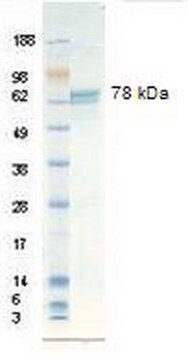239275
ácido meta-fosfórico
ACS reagent, chips, 33.5-36.5%
Sinónimos:
Ácido metafosfórico
About This Item
Productos recomendados
grade
ACS reagent
form
chips
contains
57.0-63.0% sodium phosphite as stabilizer
concentration
33.5-36.5%
density
2 g/cm3
anion traces
MnO4- reducers: ≤0.02%
chloride (Cl-): ≤0.001%
nitrate (NO3-): ≤0.001%
sulfate (SO42-): ≤0.005%
cation traces
As: ≤1 ppm
Fe: ≤0.005%
heavy metals: ≤0.005% (by ICP)
SMILES string
OP(=O)=O
InChI
1S/HO3P/c1-4(2)3/h(H,1,2,3)
InChI key
UEZVMMHDMIWARA-UHFFFAOYSA-N
¿Está buscando productos similares? Visita Guía de comparación de productos
Categorías relacionadas
General description
Application
- Catalizador en combinación con InCl3 para sintetizar derivados del 1,8-dioxooctahidroxanteno por la reacción de las βdicetonas cíclicas y los aldehídos.
- Precursor fosfato para sintetizar fosfato de antimonio (SbPO4) mediante reacción con el metal antimonio a elevadas temperaturas.
signalword
Danger
hcodes
Hazard Classifications
Eye Dam. 1 - Skin Corr. 1
Storage Class
8B - Non-combustible corrosive hazardous materials
wgk_germany
WGK 3
flash_point_f
Not applicable
flash_point_c
Not applicable
Certificados de análisis (COA)
Busque Certificados de análisis (COA) introduciendo el número de lote del producto. Los números de lote se encuentran en la etiqueta del producto después de las palabras «Lot» o «Batch»
¿Ya tiene este producto?
Encuentre la documentación para los productos que ha comprado recientemente en la Biblioteca de documentos.
Los clientes también vieron
Nuestro equipo de científicos tiene experiencia en todas las áreas de investigación: Ciencias de la vida, Ciencia de los materiales, Síntesis química, Cromatografía, Analítica y muchas otras.
Póngase en contacto con el Servicio técnico








